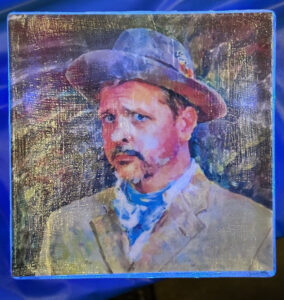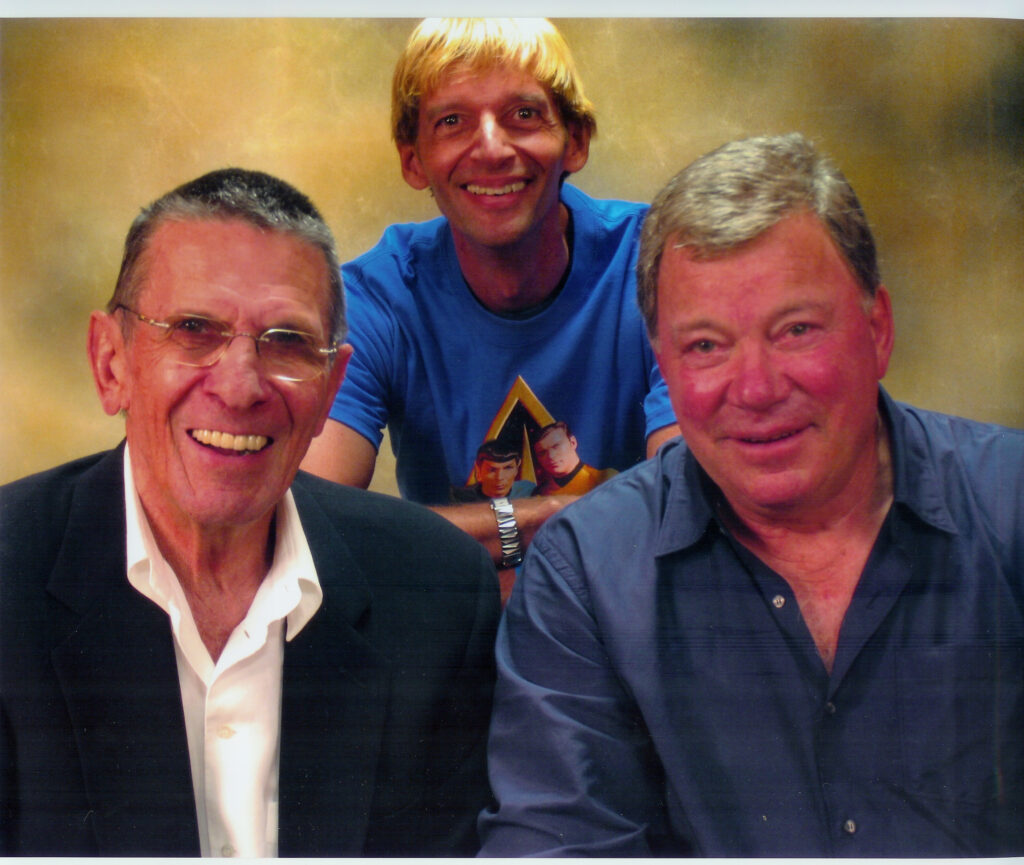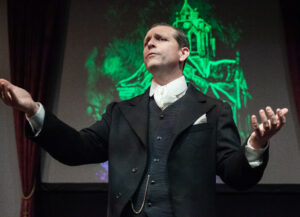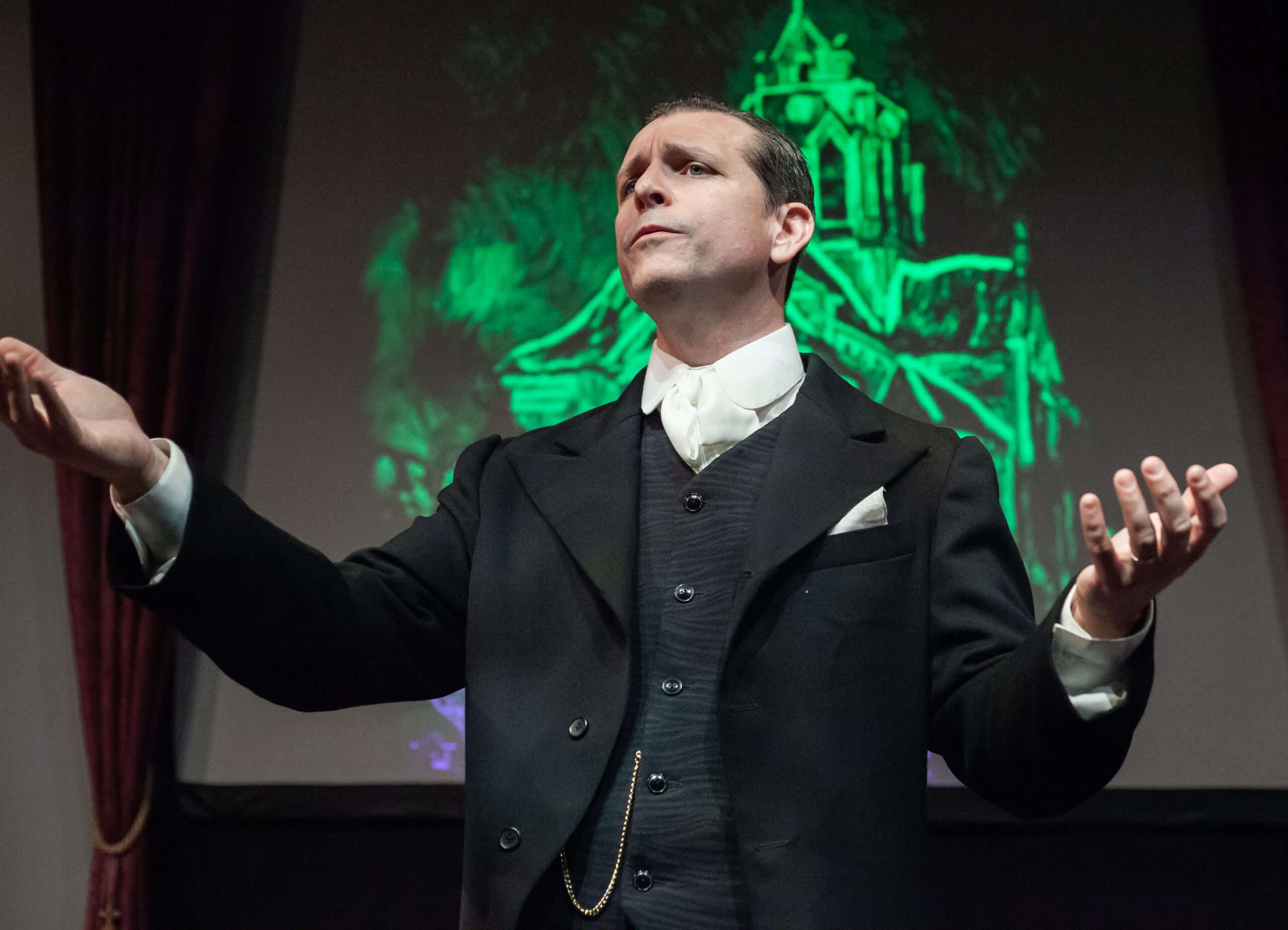If after-play questions are any indication, some people in the audience at the play Vincent had no idea it was developed by none other than Leonard Nimoy. His Star Trek character of Mr. Spock is among the best-known television characters of all time, but his career did not begin and end with Star Trek.
His artistic side most notably included photography, but here we see his foray into the world of the theatre. While he did develop this play on Vincent van Gogh, he didn’t exactly write it either. Somewhere close to 90% of the dialogue comes directly from letters Vincent exchanged with his brother Theo. Nimoy carefully selected the most dramatic and personal passages, and stitched it all together with some connecting passages of his own. Nevertheless, it is a compelling look at the last years of Van Gogh, whose real-life fame rivals that of the science fiction character Spock.
Nathan Jenkins portrayed Theo van Gogh on the evening I was at the Ground Floor Theatre to see this production by Penfold Theatre Company. He remarked on the long road to getting this on the stage. “I was attracted to this show because it’s a one-person show about Vincent van Gogh but the person on stage isn’t Vincent van Gogh – it’s his brother. It ends up being a show about this complicated mess-of-a genius artist person, but also and perhaps more importantly it’s a show about someone who deeply loves and cares for a person with mental illness. It becomes a show about how hard it is to support and care for and to love someone going through something so hard, and yet how completely worth it it is! At everytime, at every moment, he is proud of the times he chose to show up and regrets the times he didn’t.”
Work on the show began in March 2020, but was delayed by COVID. “Over the past three years when this show has been in quasi-production I think that there is a level of emotional endurance – a weariness of caring amidst tragedy. There is a sort of depth and nuance to feeling that I think many of us have more of now than we had a couple years ago. I think actors bring to their work themselves, and having more experience and life than I had three years ago I think there is more to mine in empathy and generosity and love to then bring to this character and this piece.”
 Dressed in a period costume from the 1890s (beautifully made by hand by costume designer Buffy Manners), Jenkins took on the persona of Theo which also, perhaps unexpectedly, embodied much of Vincent in him. Expressing this was a very fine piece of acting by Jenkins, who is co-founder and co-artistic Director of Penfold Theatre. The other co-founder, Ryan Crowder, is taking turns playing Theo so you may see him when you go (as you must!). [Artworks were produced for both actors expressing their Theo persona; the one for Jenkins is shown here]
Dressed in a period costume from the 1890s (beautifully made by hand by costume designer Buffy Manners), Jenkins took on the persona of Theo which also, perhaps unexpectedly, embodied much of Vincent in him. Expressing this was a very fine piece of acting by Jenkins, who is co-founder and co-artistic Director of Penfold Theatre. The other co-founder, Ryan Crowder, is taking turns playing Theo so you may see him when you go (as you must!). [Artworks were produced for both actors expressing their Theo persona; the one for Jenkins is shown here]
There are many brilliant lines in the play (written either by Vincent or Theo or Nimoy). “He seemed to thrive on failure but he was fearful of failure,” is spoken early on, and pretty much sets the tone for the rest of the play.
A key aspect of the play is Vincent’s relationship with Gauguin, the painter Theo says his brother should never have met. “That was the beginning of the end.”
For Vincent, said Theo, “the ground shook. Why did he admire Gauguin so?” At some point they “began to argue violently. Vincent threw a drink in Gauguin’s face. Then Vincent confronted Gauguin with a razor,” but instead of attacking, he turned the razor on himself and cut off his own ear. In the depths of pathos, Theo poses a rhetorical question that ricochets through the remainder of the play: “Will you ever learn to love yourself?”
Despite the turmoil, Vincent produced 2 beautiful canvases a day in his last 70 days.
Ultimately, said Theo, his brother was here “to realise great things for humanity.” One offshoot of that is this play, which I unreservedly recommend.
Tickets at: groundfloortheatre.org

Lead Photo: Nathan Jenkins stars in Vincent. Photo by Kimberley Mead
Second photo: Artwork for Mr. Jenkins as Theo
Third Photo: Dr Cunningham with Leonard Nimoy (l) and William Shatner (r)

